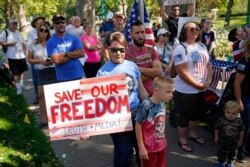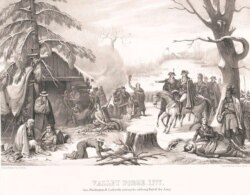When the men who founded America spoke of liberty, they didn’t necessarily mean that citizens of the new republic could do whatever they felt like doing, whenever they pleased.
“In early America, they didn't mean that liberty meant freedom from government, a total lifestyle where Americans were free to do what they wished at all times,” says Andrew Wehrman, a professor of history at Central Michigan University. “Liberty meant freedom from unjust laws or freedom from tyranny, arbitrary law. You would always be in participation with your neighbors. There would always be consent. … There wasn’t this freedom to do whatever you want.”
What is liberty?
So-called anti-maskers have protested mask-wearing requirements put in place to help stem the spread of COVID-19. They argue that being forced to wear a mask violates their constitutional right to liberty.
“These are lawfully created ordinances and mandates and requirements to protect one another. So, that sort of thing would not be seen by the founders as a loss of liberty,” Wehrman says. “It's a mistake to think of liberty as absolute self-indulgence without restraint. We don't have the liberty to set our own house on fire, because it might affect other houses.”
Brad Birzer, co-founder of the online journal, The Imaginative Conservative, imagines the Founding Fathers would agree and disagree with anti-maskers.
“I'm not an anti-masker, but from what I understand of the anti-maskers, they tend to think that this is coming from a level of government that shouldn't be involved in this,” says Birzer, who is also a professor of history at Hillsdale College.
“I don't think that the founders would have really appreciated all kinds of mandates coming from the national government, but they certainly didn't mind various mandates. ... There's no doubt that, in local communities, it was always acceptable for there to be local regulations for things like that.”
What would the founders do?
America’s founders restricted certain freedoms when they fought to contain contagious diseases during the late 1700s.
Smallpox spread through military camps and densely populated cities, including occupied Boston. General George Washington, who later became America’s first president, feared the illness could seriously cripple his army as it fought the Revolutionary War.
Consequently, people fleeing Boston were often required to be smoked, which involved entering a smokehouse to be fumigated by the heat and smoke of a wood or charcoal fire topped with materials like sulphur, which were thought to be disinfectants.
Washington ordered that all of his troops be inoculated against smallpox — the first publicly funded immunization drive in American history.
There are also examples of other measures that restricted freedom of movement.
When yellow fever struck Philadelphia in 1793, Alexander Hamilton and his wife, Eliza, ran into roadblocks when trying to reach Albany, New York.
“At town after town, they had to contend with barriers erected to keep out potentially contagious Philadelphians. Even New York posted guards at entrances to the city to deter fugitives from the plague-ridden capital,” writes Ron Chernow in his biography “Alexander Hamilton.”
“Early Americans understood that times of disease called for this shared sacrifice for the common good,” says Wehrman. “It's very different to see liberty weaponized in this way to get out of a hassle, or to see it politicized in this way. They didn’t have political parties where one faction in the United States said, ‘We’re not going to pay attention to the town gate or to the smoking or to the quarantine of our goods.’”
Striking a balance
Birzer believes anti-maskers are confusing the notions of liberty and individualism, a core American value associated with personal freedom and limited government interference.
“There's definitely a sense in which individualism meshes with liberty, but I think that the founders would have also been very taken with the idea of moral responsibility,” Birzer says. “So, if it's truly the moral thing to do what's right for the community, you should be doing that, regardless of whether you've been told to do it or not, (because) it is the right thing.”
The U.S. Constitution talks about “We the People of the United States” forming a more perfect union by, among other things, taking actions that “promote the general Welfare,” of the nation.
Birzer thinks the founders would try to strike a balance between citizens’ rights and duties — the right to be free from government interference, but also the duty to be good neighbors to one another.
And some founders like Thomas Jefferson, who believed dissent was necessary for a healthy democracy, might find something else to like about the anti-maskers.
“I think there … would be a strain within the founders that would be very happy that there was a sense that regular people, who were not in government, are resisting certain things,” Birzer says.






